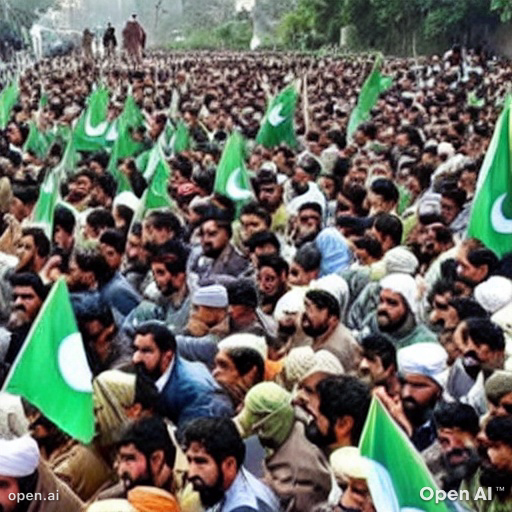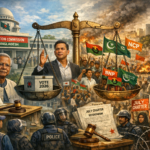Introduction
Pakistan, a nation characterized by its rich history, diverse culture, and complex socio-political landscape, has once again found itself at the crossroads of political turmoil and democratic uncertainty. The interplay between civilian governments and the military has cast a long shadow over the nation’s democratic aspirations, leaving citizens and observers grappling with the implications for its future. This article delves into the recent political upheaval, the role of the military, the fate of Imran Khan, the caretaker government, and the potential trajectory of the upcoming elections.
Historical Context: The Struggle for Democracy
Pakistan’s struggle for democracy has been a tumultuous journey, marred by periods of military rule and political instability. The country’s checkered past, marked by military interventions and weak civilian governments, underscores the challenge of maintaining a sustainable democratic system. The echoes of history reverberate in the current political landscape, where the civilian-military dynamic continues to shape the course of governance.
Political Turmoil: Testing the Fragile Democracy
In recent times, Pakistan has witnessed a fresh wave of political turmoil. Protests, allegations of electoral manipulation, and power struggles between opposition parties and the ruling establishment have intensified the underlying tensions. The opposition’s accusations of the military’s alleged interference in electoral processes have ignited public discourse, bringing into focus the complex relationship between democratic institutions and military influence.
The Military’s Role: A Shadow Over Democracy
The Pakistani military’s historical involvement in politics has remained a contentious issue. The military’s influence is deeply embedded in the country’s power structure, often overshadowing elected civilian governments. It has played a direct role in politics through coups, indirectly influenced policies, and maintained a formidable presence in security matters. This influence has prompted concerns about the erosion of democratic norms and the potential for military dominance in shaping the nation’s trajectory.
Imran Khan’s Fate: Navigating Troubled Waters
Imran Khan, once hailed as a beacon of hope for change, now finds his leadership mired in challenges. As the head of the ruling party, his tenure has faced criticism over economic woes, governance issues, and allegations of political manipulation. The fate of Khan’s government is a reflection of the broader challenges facing Pakistan’s democratic experiment, where the interplay between civilian leadership, military dynamics, and public sentiment creates a complex web of pressures.
Imran Khan, the charismatic leader of Pakistan, has undergone a notable transformation that has caught the attention of Western democracies. His evolution from a renowned cricketer and womanizing playboy to a devout advocate of religious practices, often seen with a prayer bead (tasbih) in his hand, has raised eyebrows and sparked concerns among global observers. This abrupt ideological shift has generated speculation about potential affiliations with radical groups, setting off alarm bells in a modern world where transparency, secularism, and the separation of religion from politics are highly valued. While Khan’s personal journey and the sincerity of his religious convictions are subject to interpretation, the fear of clandestine alliances between influential figures and radical elements remains a central concern for Western nations striving to maintain stability and counter the spread of extremist ideologies. As a result, Khan’s transformation has not only generated intrigue but has also intensified the scrutiny on his policies and alliances, as Western democracies grapple with the complex interplay between personal convictions, political motives, and the global fight against radicalism.
Caretaker Government: A Bridge to the Future
In the wake of political turmoil, the notion of a caretaker government gains significance. This transitional administration serves as a bridge between successive elections, ensuring a level playing field and impartial oversight. The composition and functioning of the caretaker government can influence the electoral process’s integrity and determine whether the upcoming elections will reflect the will of the people or exacerbate existing tensions.
The Future of Elections: Navigating Uncertainty
The path ahead for Pakistan’s democracy remains uncertain. The upcoming elections hold the promise of change, but they also carry the weight of historical precedents and present challenges. The ability to conduct free, fair, and transparent elections is crucial to reinforcing faith in democratic processes. The nation’s trajectory hinges on its capacity to address power imbalances, enhance electoral integrity, and strike a delicate balance between civilian governance and military influence.
To truly understand the complex interplay of democracy and military influence in Pakistan, one must delve into the historical backdrop of the 1971 Bangladesh Liberation War. The events leading up to the separation of East Pakistan (now Bangladesh) unveiled a tragic chapter in the nation’s history. The suppression of democratic rights, political discontent, and economic disparities ignited a separatist movement that culminated in a brutal military crackdown. The Pakistan Army’s actions in East Pakistan left a scar on the nation’s democratic fabric, raising questions about the military’s role in democratic governance.
Drawing Parallels: Lessons from History
As Pakistan navigates its contemporary political landscape, there are concerns about whether history might repeat itself. The parallels drawn between the 1971 tragedy and the current situation raise critical questions about the military’s intentions in mainland Pakistan. While circumstances differ, the memory of the military’s unchecked power and its dire consequences continues to loom large. Observers are vigilant about any signs of a similar scenario unfolding on the mainland, with implications for democratic norms and civilian governance.
Looking Ahead: Balancing Democracy and Military Influence
The wounds inflicted during the 1971 crisis still resonate, casting a shadow over Pakistan’s democratic aspirations. While the prospect of a repeat scenario remains speculative, it underscores the need for a delicate balance between civilian leadership and military influence. As the nation approaches another pivotal juncture in its democratic journey, the lessons from history serve as a reminder of the importance of fostering a culture of democratic values, respecting constitutional norms, and promoting accountability.
Conclusion
Pakistan’s journey toward a stable and enduring democracy remains a complex endeavor, shaped by historical context, political turmoil, military dynamics, and leadership transitions. As the nation navigates through these challenges, it must draw from its rich history and democratic aspirations to chart a course that upholds the principles of democratic governance while acknowledging the realities of its intricate political landscape. Only through collective efforts to strengthen institutions, ensure transparency, and engage in open dialogue can Pakistan overcome the stains on its democratic prism and inch closer to a more stable democratic future.
The historical backdrop of the 1971 tragedy in East Pakistan serves as a poignant reminder of the consequences when the military overshadows democratic principles. While drawing direct parallels to the current political turmoil might be overly simplistic, the echoes of history beckon Pakistan to tread cautiously. The nation’s pursuit of a stable and enduring democracy requires a commitment to learning from past mistakes and ensuring that the military plays a constructive role within the boundaries of democratic governance. Only through such introspection and vigilance can Pakistan forge a path forward that respects its democratic ideals while addressing the challenges posed by its complex political landscape.
Bibliography:
- Haqqani, Husain. “Pakistan: Between Mosque and Military.” Carnegie Endowment for International Peace, 2005.
- Hussain, Mazhar. “Pakistan: A Personal History.” Penguin Books, 2011.
- Fair, C. Christine. “Fighting to the End: The Pakistan Army’s Way of War.” Oxford University Press, 2014.
- Malik, Iftikhar H. “The Politics of Military’s Role in Pakistan.” Routledge, 2007.
- Siddiqa, Ayesha. “Military Inc.: Inside Pakistan’s Military Economy.” Pluto Press, 2007.






